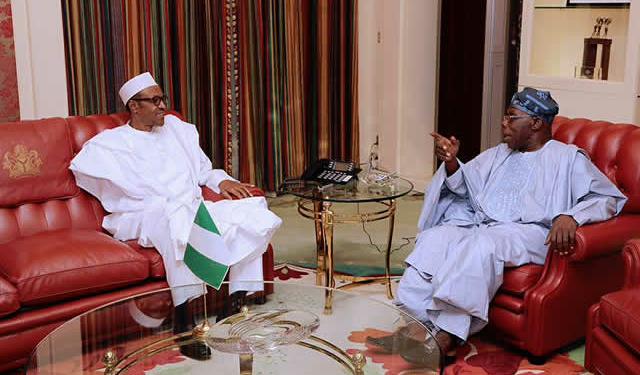- Obasanjo accused Malami of pushing for the controversial pardons, claiming corruption was involved in the clemency process.
- He alleged Malami’s influence ensured the pardons, despite the ex-governors not being terminally ill as initially claimed.
- The state pardon decision caused public backlash, with many arguing it undermined the fight against corruption in Nigeria.
Former President Olusegun Obasanjo has severely condemned the leadership and governance of ex-President Muhammadu Buhari’s administration, expressing strong disapproval of its overall performance during his tenure.
Obasanjo asserted that Buhari’s government was the worst in Nigeria’s democratic era, alleging that corruption was deeply entrenched and at an all-time high under his rule.
He further characterised Abubakar Malami, the former attorney-general of the federation, as a “devil’s workshop.”
The ex-president presented these claims in his recently published book, ‘Nigeria: Past and Future’, which was launched last week to commemorate his 88th birthday.
“The most atrocious waste, the entrenchment of corruption, and the suppression of officials fighting it occurred under President Buhari’s watch and his attorney general, Abubakar Malami, whom he turned into a ‘devil’s workshop,” PUNCH quoted Obasanjo as alleging.
In 2022, former President Buhari granted a pardon for Joshua Dariye, who had governed Plateau State, and Jolly Nyame, a former governor of Taraba State.
Nyame had been sentenced to 12 years imprisonment for embezzling N1.64 billion in public funds, whereas Dariye was serving a 10-year term for N1.126 billion fraud.
The two ex-governors were included among 159 prisoners granted clemency at a council of state meeting, with their pardons justified on the basis of age and deteriorating health.
Obasanjo alleged that Malami had persistently urged Buhari to approve the pardons, claiming the process was corrupt and that both individuals were not terminally ill, as asserted.
“It was all part of Malami’s financial shenanigans, and he played many such schemes to his advantage,” the ex-president alleged.
“His principal concurred, condoned, turned a blind eye and a deaf ear, and paid lip service to fighting corruption while cohabiting comfortably with corruption in multifarious ways.”
At the time the state pardon was granted, it stirred controversy, with many arguing that it undermined efforts to combat corruption in Nigeria’s political system.
Nevertheless, the presidency at the time justified the decision, stating that the clemency was granted in the spirit of fairness and equity.








Discussion about this post